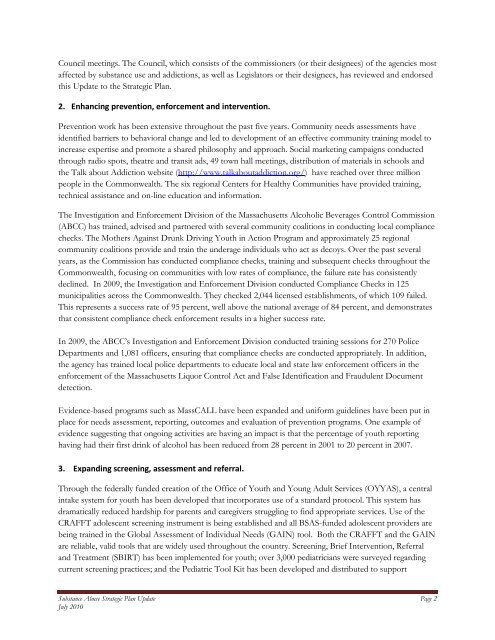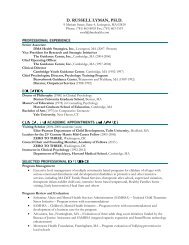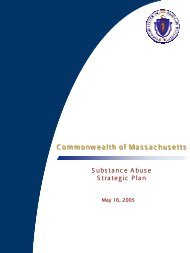Commonwealth of Massachusetts - DMA Health Strategies
Commonwealth of Massachusetts - DMA Health Strategies
Commonwealth of Massachusetts - DMA Health Strategies
- No tags were found...
Create successful ePaper yourself
Turn your PDF publications into a flip-book with our unique Google optimized e-Paper software.
Council meetings. The Council, which consists <strong>of</strong> the commissioners (or their designees) <strong>of</strong> the agencies mostaffected by substance use and addictions, as well as Legislators or their designees, has reviewed and endorsedthis Update to the Strategic Plan.2. Enhancing prevention, enforcement and intervention.Prevention work has been extensive throughout the past five years. Community needs assessments haveidentified barriers to behavioral change and led to development <strong>of</strong> an effective community training model toincrease expertise and promote a shared philosophy and approach. Social marketing campaigns conductedthrough radio spots, theatre and transit ads, 49 town hall meetings, distribution <strong>of</strong> materials in schools andthe Talk about Addiction website (http://www.talkaboutaddiction.org/) have reached over three millionpeople in the <strong>Commonwealth</strong>. The six regional Centers for <strong>Health</strong>y Communities have provided training,technical assistance and on-line education and information.The Investigation and Enforcement Division <strong>of</strong> the <strong>Massachusetts</strong> Alcoholic Beverages Control Commission(ABCC) has trained, advised and partnered with several community coalitions in conducting local compliancechecks. The Mothers Against Drunk Driving Youth in Action Program and approximately 25 regionalcommunity coalitions provide and train the underage individuals who act as decoys. Over the past severalyears, as the Commission has conducted compliance checks, training and subsequent checks throughout the<strong>Commonwealth</strong>, focusing on communities with low rates <strong>of</strong> compliance, the failure rate has consistentlydeclined. In 2009, the Investigation and Enforcement Division conducted Compliance Checks in 125municipalities across the <strong>Commonwealth</strong>. They checked 2,044 licensed establishments, <strong>of</strong> which 109 failed.This represents a success rate <strong>of</strong> 95 percent, well above the national average <strong>of</strong> 84 percent, and demonstratesthat consistent compliance check enforcement results in a higher success rate.In 2009, the ABCC’s Investigation and Enforcement Division conducted training sessions for 270 PoliceDepartments and 1,081 <strong>of</strong>ficers, ensuring that compliance checks are conducted appropriately. In addition,the agency has trained local police departments to educate local and state law enforcement <strong>of</strong>ficers in theenforcement <strong>of</strong> the <strong>Massachusetts</strong> Liquor Control Act and False Identification and Fraudulent Documentdetection.Evidence-based programs such as MassCALL have been expanded and uniform guidelines have been put inplace for needs assessment, reporting, outcomes and evaluation <strong>of</strong> prevention programs. One example <strong>of</strong>evidence suggesting that ongoing activities are having an impact is that the percentage <strong>of</strong> youth reportinghaving had their first drink <strong>of</strong> alcohol has been reduced from 28 percent in 2001 to 20 percent in 2007.3. Expanding screening, assessment and referral.Through the federally funded creation <strong>of</strong> the Office <strong>of</strong> Youth and Young Adult Services (OYYAS), a centralintake system for youth has been developed that incorporates use <strong>of</strong> a standard protocol. This system hasdramatically reduced hardship for parents and caregivers struggling to find appropriate services. Use <strong>of</strong> theCRAFFT adolescent screening instrument is being established and all BSAS-funded adolescent providers arebeing trained in the Global Assessment <strong>of</strong> Individual Needs (GAIN) tool. Both the CRAFFT and the GAINare reliable, valid tools that are widely used throughout the country. Screening, Brief Intervention, Referraland Treatment (SBIRT) has been implemented for youth; over 3,000 pediatricians were surveyed regardingcurrent screening practices; and the Pediatric Tool Kit has been developed and distributed to supportSubstance Abuse Strategic Plan Update Page 2July 2010





